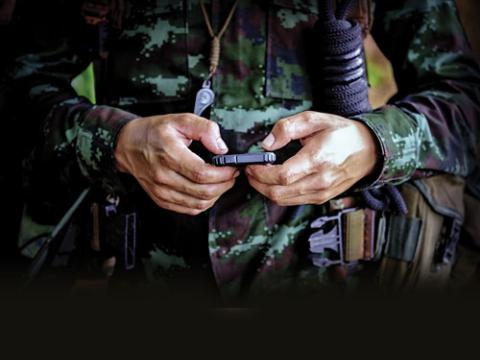Q: What are the Legal Pitfalls for Service Members When Using Social Media?
Few people go more than a few days without updating their Facebook status, “checking-in” at some location on their social media application or tweeting their opinions on Twitter. Service members are no exception. However, they must take extra precautions to avoid the legal pitfalls of compromising operational security or making inappropriate remarks when posting anything on public websites. The legal ramifications for improperly posting information or photos on nonsecure websites, compromising operational security, varies greatly depending on an individual’s situation, what information is disclosed and the results from the disclosure. Punitive and administrative actions are authorized if a violation of the Uniformed Code of Military Justice (UCMJ) is discovered by the command. Punitive action can range from an Article 15 (nonjudicial punishment) to a general court-martial for a violation of UCMJ Article 92—the failure to obey a lawful order or regulation. Administrative action could include rank reduction, letters of reprimand that may be filed permanently in the service member’s Official Military Personnel File or administrative separation.
More frequently, service members post information to Facebook or social media sites that causes trouble in other ways. Posting a photo of one’s platoon sergeant at work and making disparaging remarks about him or her is a direct violation of UCMJ Article 89, Disrespect Toward a Superior Commissioned Officer. The maximum punishment for this violation is a bad-conduct discharge, forfeiture of all pay and allowances, and confinement for up to one year. Updating a Facebook status to express displeasure against the U.S. military and an upcoming deployment may be found to be in violation of UCMJ Article 134, Disloyal Statements. The maximum punishment, depending on the statement and the circumstances, is a dishonorable discharge, forfeiture of all pay and allowances, and confinement for up to three years.
Additionally, military prosecutors are well aware of the wealth of information troops post on social media sites. Photos of misconduct may be found and obtained by trial counsel for use as evidence against the service member in support of punitive and administrative action. Even personnel who do not post information or photos to social media sites should take care to ensure their associates do not implicate them in misconduct by posting photos of them or tagging them in their posts.
For example, a military police officer who brought his wife to work for the midnight shift as gate guard dressed up in his uniform—impersonating a service member—and posted photos of her “working the gate” on Facebook could set up his colleagues for disciplinary action. If it is later revealed they were on shift at the same time and failed to say anything about the inappropriateness of the officer or his civilian wife wearing his uniform, they could be implicated in the crime for aiding or abetting in violation of UCMJ Article 77, or failure to obey a lawful order or regulation in violation of Article 92, among other possible UCMJ violations.
Additionally, if troops are tagged in a photograph of misconduct, such as an underage drinking party where a lower-enlisted service member was sexually assaulted, the tagged persons may be called in for questioning during an investigation. Depending on rank and level of involvement, charges may be preferred against them for fraternization or being drunk and disorderly.
Furthermore, social media has operational security implications. Operational security is everyone’s responsibility, and uniformed personnel are encouraged to consult their supervisors if they are unsure of the measures in place for their location and mission. Service members should always be especially cautious when posting their locations, specifics about what they are or are not doing, and photos of themselves in uniform on social media websites or online blogs. Regardless of your privacy settings on any social media site, those sites are not secure and cannot be trusted to keep your information out of the wrong hands.
There is certainly nothing wrong with maintaining social media sites such as Facebook or Twitter, but all service members need to be careful how they use them and what they post. A good rule of thumb is to ask whether a commander or superior officer would approve prior to posting anything online.
Nicole Woodroffe previously served as trial counsel at 3rd Infantry Division with the U.S. Army JAG Corps.










Comments